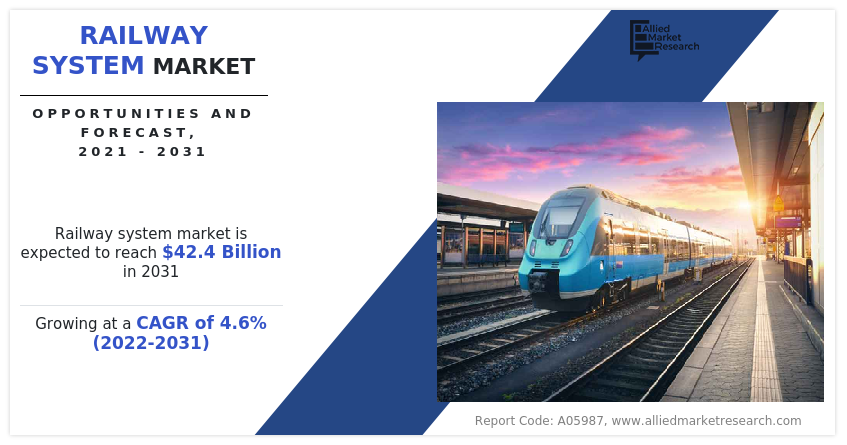According to a new report published by Allied Market Research, titled, “Railway System Market,” The railway system market was valued at $27.2 billion in 2021, and is estimated to reach $42.4 billion by 2031, growing at a CAGR of 4.6% from 2022 to 2031.
Download Free Sample – https://www.alliedmarketresearch.com/request-sample/6352
Asia-Pacific is expected to experience significant growth during the forecast period. Countries such as China, India, Australia, and Japan are largely focused on developing metros and monorails for intra-city travel to reduce the travelling time and regulate the pollution in the region. Moreover, increase in trade in the region is attributed to rise in investments by governments for rail freights used for movement of goods. For instance, governments of India and Nepal launched Jaynagar-Kurtha Railway link, a cross-border railway aimed at enhancing investment, commerce, and trading activities between the two countries.
In addition, many companies and governments of various Asian countries are considerably investing to replace and upgrade their existing rolling stock. Such factors primarily drive the growth of the global railway systems market in Asia-Pacific. Moreover, strong presence of leading rolling stock manufactures coupled with increased production, domestic demand, and capacity expansions by these manufacturers further boost the market growth.
Japan has metros and trains running at all the levels of automation from metros to trams with most of the trains running in fully automated mode. About 180 rail companies are present in Japan, and most of them are privately held. In addition, Japan is one of the most railway-dependent countries in the world. Local governments are putting more capital for advancing the existing rail network. Hence, planned expansions of the Japanese railways network are fostering the growth of the railway system market in Japan. For instance, construction of the Linear Chuo-line, the first commercial rail-line using Magnetic Levitation (Maglev) technology between Tokyo Shinagawa station and Nagoya is already underway and is expected to be completed by around 2027.
Interested to Procure the Research Report? Inquire Before Buying – https://www.alliedmarketresearch.com/purchase-enquiry/6352
Growth in demand for safety and compliance in rail transit has led to greater adoption of anti-collision system, control systems and safety systems in recent years. For instance, in June 2022, the Federal Railroad Administration (FRA) announced over $368 million in Consolidated Rail Infrastructure and Safety Improvements (CRISI) grant program funds to 46 projects in 32 states and the District of Columbia. These investments are expected to play a crucial role in modernizing rail infrastructure and supply chains, assisting in reducing crowding and travel time at reasonable costs.
Moreover, safety system manufacturers are entering into agreements with rolling stock companies to provide and install control and safety systems to prevent trains from crossing red signals, over speeding, or overrunning. For instance, in January 2021, Bombardier signed an agreement with Porterbrook to fit digital onboard signaling and Automatic Train Protection (ATP) system on ELECTROSTAR trains in the UK to prevent speeding and Signal Passing at Danger (SPAD) in train operations and prevent dangerous accidents.
Procure Research Report at: https://www.alliedmarketresearch.com/railway-system-market/purchase-options
KEY FINDINGS OF THE STUDY
- By type, the metro segment is anticipated to exhibit significant growth in the near future.
- By end use, the passenger transit segment is anticipated to exhibit significant growth in the near future.
- By system type, the train safety segment is anticipated to exhibit significant growth in the near future.
- By region, Asia-Pacific is anticipated to register the highest CAGR during the forecast period.
Key players operating in the global railway system market include Alstom SA, CRRC Corporation Limited, Siemens AG, Hitachi Ltd., Stadler Rail AG, Transmashholding, Knorr-Bremse AG, ABB Ltd., Toshiba Corporation, and Wabtec Corporation.
